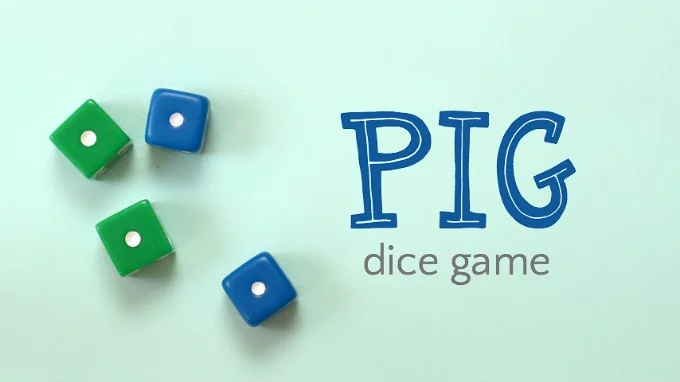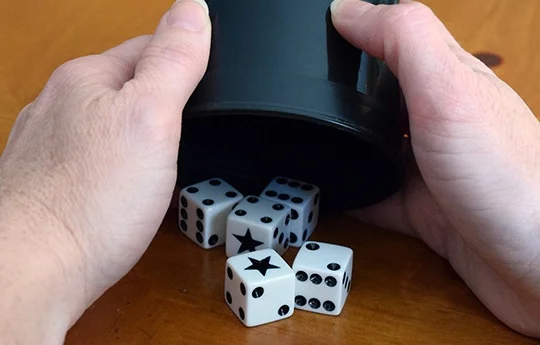Y'all wanna see a magic trick?
Alright, I have in my hands ten cards. Nothing up my sleeves. Just watch and enjoy:
If you've been reading Games for Young Minds since the beginning, you know one of my absolute favorite games is Blokus. The game is incredibly easy to learn, accessible to kids of almost all ages, and still fun for adults.
I've been wanting to share the game again, especially since my readership has grown so much since November 2017! Fortunately, I have just the excuse: Over the winter holiday, I came up with a fun, cooperative twist on the game that has been a big hit at home.
So let's visit, or revisit, one of the greatest little games out there.
Let's say I make you a wager. You roll this die a certain number of times. At the end, I'll give you $100, so long as you never roll a 1. If you do end up rolling a 1, then you have to pay me $100.
How many rolls of the dice would you risk? Surely, you'd roll once, right? After all, the odds of winning are 5 out of 6. But only a fool would roll that die 30 or 50 or 100 times in a row.
So when does some outcome change from "unlikely" to "likely"? And how can you help your kids build an intuition for that idea, before they start wasting all their money on lottery tickets?
Maybe a quick game of Pig might help.
When you play Monopoly with your kids, let them be the banker. Yes, I know, this will make the game even longer. It's worth the wait.
Kids today need as much exposure to handling money as possible. Maybe you're unconvinced: with credit cards and Venmo, kids don't need to learn how to make change and count bills anymore, right?
I fully disagree. In fact, I think the opposite is true: In previous generations, parents and kids had numerous opportunities to talk about math while paying for groceries or settling up at the pharmacy. Kids naturally gravitate to these shiny coins and green slips of paper, and their questions gave parents a chance to talk about how pennies convert to nickels and how $1 bills compare to $20s.
As I type this, my son is playing Monopoly with his closest friend. I'm elated for two reasons. First, he's doing a ton of mathematical thinking right now. And more importantly, I don't have to play.
Maybe you've wondered why it's taken me over a year to write about the most famous board game of all time. Honestly, it's because Monopoly just isn't my favorite game. The first 20 minutes or so are fun, as you collect properties and try to negotiate trades with your opponents.
But after that, a sense of dread sets in as you realize that one player lucked into a much better set of properties than the others, and it's just a matter of time before they win. But when I say time, I mean time. Games can last two hours, and usually the person on the bad end of a bankruptcy feels pretty miserable for the last hour or so, as they barely pull their way out of poverty, only to slide back down due to a bad roll of the dice.
(It's almost like the creator of the game was making a point about capitalism!)
But my son loves the game, and his love of the game has made me re-evaluate Monopoly and think of ways to keep the fun and the math, while removing a bit of the grind. In next week's newsletter, I'll spend the whole time talking about the role of the banker. This week, I'll focus on the dice, the board, and the proper way to play Monopoly.
I spent my entire childhood playing with LEGO sets. I hardly ever built the designs on the boxes. Instead, my friend Turner and I would try to invent our own space ships, robots, and bat caves, using whatever bricks we had handy.
My son, on the other hand, prefers to build exactly what is on the box and then set it on the shelf for months at a time. So when I cajole and encourage him to make something from his own imagination, I don't often get far.
Fortunately, my friend Joel Bezaire shared a perfect way to turn LEGO building into a game. It's called the LEGO Blindfold Build Challenge.
Sometimes I am deeply grateful that my son is just as interested in board games as I am. Other times, I feel like I've created a monster.
The kid wakes up at 6am on the weekends and jumps on my bed, waking me up with "Chess?"
"You know, I'm probably going to need a second to wake up before we launch into any games."
"Ok, so then after you have coffee we can play?"
Clearly he understands the concept of checkmate.
All of that to say, my son's most recent obsession was the game Patchwork, which I got him for Hanukkah. It's a great game for us to play, since it's specifically designed for two players and has enough strategy to keep me guessing. We've probably played it between 15 and 20 times in the past month, and I'm still happy to play whenever he wants.
As long as I've had my coffee.
If you are a reader of Games for Young Minds, then you are probably either:
a) A parent of kids who, after a long Winter Break, need something to keep them entertained so they will Stop. Screaming. At. Each. Other.
b) A teacher who is trying to think of a fun activity for the first day of the new semester.
c) All of the above
I fall into that third category, so I thought I'd share a game that is always one of my biggest hits of the school year: Liar's Dice. This is also a perfect home-for-the-holidays game, since you can easily accommodate three, four, or more players. As long as you have enough dice for everyone, everyone in the family can join!
This week, I'm sharing one of the games from my Holiday Gift Guide. I hadn't intended to write about Kingdomino so soon, but my son just can't get enough of the game. As it happens, I was able to capture some great video of him thinking through some of the math in the game, and I couldn't resist sharing.
Kingdomino is a great game for two, three or four players, but my son and I both prefer the two-player version. The strategy gets harder, the scores go higher, and there seem to be more ways to win.
Sometimes I want a game that will take up an entire hour, the sort of game that can absorb me and my kids on a rainy afternoon. On those days, I reach for Qwirkle or Mastermind.
But other times, I just need a game that will keep my kids occupied for ten minutes while we wait for the dentist to call us back. In those moments, I am looking for a game that is quick, fun, and easy to learn.
Dots and Boxes is a perfect game for these situations. All you need is a pencil and paper (or a crayon and the back of a kid's menu). Of course, knowing me, I've found all sorts of deeper math in this simple game. But first let's just take a look at how the game is played.
Looking for a gift for your kids that's fun, but perhaps a little more intellectually stimulating than the Nerf MurderGun 5000 or Princess Daenerys's Glitter-Shedding Dragon? Don't worry, Games for Young Minds has got you covered.
Below, I've shared two games for each age level: One game that I've profiled previously, and a new game that I haven't gotten the chance to write about. No matter what age your child or what games they've played before, you should be able to find something useful below. Enjoy!
Have you ever played one of those people in Scrabble who knows all the two-letter words?
I'm not talking about "it" and "he." I mean someone who confidently plays "qi" and then dares you to Google it.
My friend Robin is one of those people. I have played her in Scrabble since high school, and I have no idea how many times I've lost to her. But I definitely remember how many times I've won: zero.
Don't get me wrong, Scrabble is a fantastic game. Someday I'll probably write a newsletter (or three) about it. But it does pose a problem, especially for parents: How do you play a word-based game with a kid (or friend) with a much lower vocabulary than you? What if your kid can't even read or spell yet?
Fortunately, I have found the perfect introductory game to the fun and strategy of Scrabble: Qwirkle. If you play Qwirkle with your five-, six-, and seven-year-olds, they'll be totally ready to dive into Scrabble as older kids.












